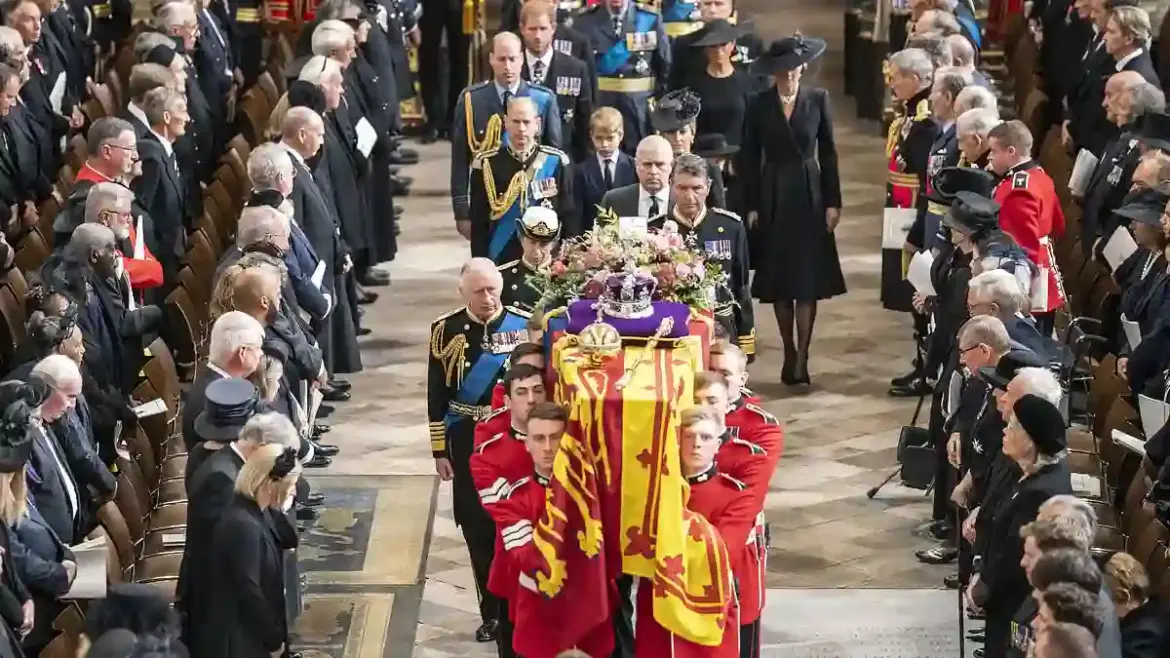It’s hard to believe that three years have already passed since I queued through the autumn evening to see Queen Elizabeth lying in state.
The memory remains vivid: the kind, friendly people around me, the golden light over the Thames slowly fading into darkness, and the quiet reverence that filled Westminster Hall as we filed past her catafalque.
That evening was a bridge between eras—a moment when the old world seemed to linger, just before the new one crept in.
Even back then, the significance didn’t fully sink in.
I had been in Strasbourg when the news broke, and I was struck by the French response.
They, if anything, seemed more monarchist than we are in Britain.
Flags flew at half-mast, and the cathedral bell tolled 96 times, one for each year of her life, resonating across the Rhine into Germany.
The Weight of a Long Reign
It wasn’t until the funeral, when the sceptre, orb, and crown were lifted from her coffin, that the reality hit me fully.
A shiver ran through me—a recognition that something profoundly good had left the world, replaced by something smaller, greyer, and less inspiring.
This isn’t about sympathy for the Royal Family personally—I am a political monarchist, not a sentimental one.
Figures like James II and Edward VIII have left me indifferent. But Elizabeth II was different.
Her long life maintained a subtle but powerful sense of order, honor, and civility in Britain, keeping small-mindedness and cynicism at bay.
That spell is now fading, leaving the country more exposed to a harsher, more worldly reality.
Walking home after the lying-in-state, Tennyson’s words came to mind:
“How thin and clear,
And thinner, clearer, farther going!
O, sweet and far from cliff and scar
The horns of Elfland faintly blowing.”
Many people have remarked recently that Britain feels rudderless without the Queen. I believe they’re right.
Silence and Unanswered Questions About Trump’s Gunman
The shocking murder of Charlie Kirk recently reminded me how little is still known about the attempted assassination of Donald Trump in July 2024.
Thomas Crooks, the would-be assassin, was killed at the scene, and much about him remains unclear.
Many assume he was mentally unstable, likely influenced by drugs, but mainstream media either overlooked or suppressed the details.
For instance, claims that Crooks had lived with his grandparents until they caught him using drugs have never been properly sourced or investigated.
Reflections on Europe and the Modern Risks
Turning to international matters, recent events with Russia and Poland highlight how fragile global security can feel.
When Russian drones entered Polish airspace, some predicted the start of a new world war.
Yet a far more serious incident occurred in 2022, when the Nord Stream undersea gas pipeline between Russia and Germany was blown up.
Poland’s then-Foreign Minister, Radek Sikorski, openly celebrated what he assumed was American involvement, only for the Kremlin to use his words as propaganda.
Such denials are a regular part of international politics, but they are worth noting.
Imagine if a Russian act of sabotage hit American infrastructure—denials would follow, but outrage would be immediate.
Europe remains scarred by historical grievances, and Poland has reason to fear collusion between Germany and Russia.
Historical Memory and a Nostalgic Glance Back
A few weeks ago, in Gdansk, the very site where World War II began, Poland’s president called for reparations from Germany.
Europe’s old wounds are never far from the surface, and modern leaders seem oddly willing to revive them.
In light of all this, I find myself increasingly nostalgic for the Cold War era—a time when tensions were clear, rules were understood, and the balance of power offered a strange sort of stability.
Britain and Europe continue to navigate a world of uncertainty, but the loss of figures like Elizabeth II reminds us that guidance, gravitas, and a sense of historical continuity are rare and precious.
